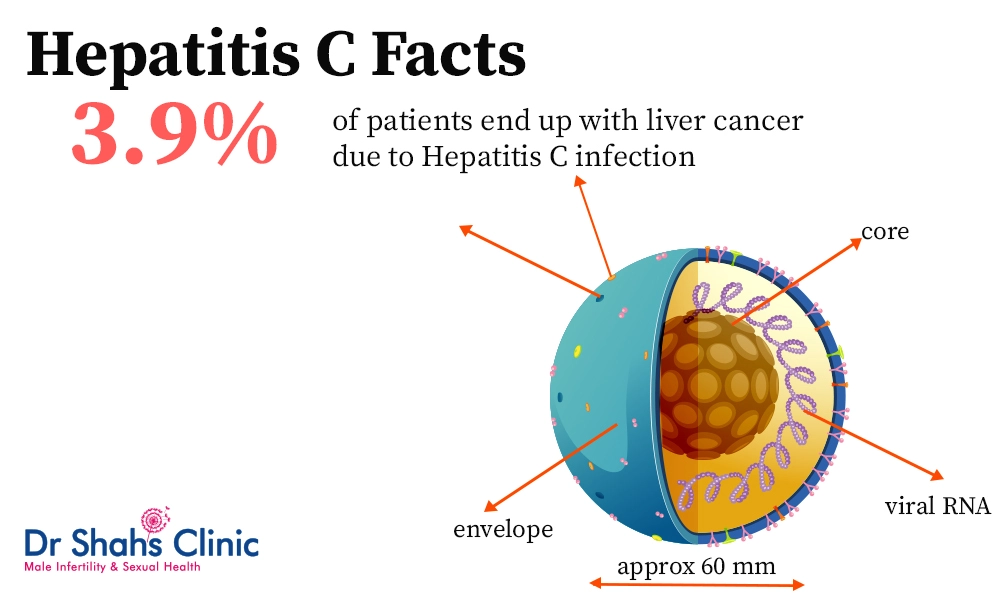A-Z About Hepatitis C treatment
Hepatitis C treatment, Prevention, Diagnosis & Cure
Vanakkam, Namaste, and Welcome to Dr. Shah’s Clinic for Male Infertility & Sexual Health.
In this article, I am going to tell you everything under the sun about Hepatitis C treatment in chenna. We are also going to discuss Hepatitis symptoms, diagnosis, and management.
As a practicing sexologist doctor in Chennai, I have seen numerous patients suffer from Hepatitis due to an improper diagnosis or treatment.
Sadly, close to an estimated 71 million people globally have chronic hepatitis C virus infection.
There are high chances of those who are chronically infected to develop cirrhosis or liver cancer.
Moreover, according to WHO’s 2016 estimation approximately 399 000 people died from hepatitis C, mostly from cirrhosis and hepatocellular carcinoma (primary liver cancer).
We are here to help
Book an appointment
How does Hepatitis C Spread?
The Hepatitis C virus is a bloodborne virus. Furthermore, the mode of transmission is mainly caused by exposure to small quantities of blood.
Consequently, the transmission of this virus happens through
- Organ transplantation,
- Unprotected sexual practices that lead to exposure to blood (sex during menses, anal sex, etc.,), unscreened blood and blood products
The incidence of infection is high in men who have sex with men.
For high-risk patients, routine screening of all sexually transmitted diseases is advisable.
Some common diseases that require testing along with Hepatitis C include std’s like syphilis, chlamydia, and also gonorrhea, HIV, and lastly genital herpes
When you visit an std clinic, your doctor will take an in-depth medical history and also screen you for the aforementioned common STDs
What are the symptoms of Hepatitis C?
The incubation period for hepatitis C ranges from 2 weeks to 6 months.
Most people with the initial infection do not show any symptoms.
Those who are acutely symptomatic may get fever, fatigue, decreased appetite, nausea, vomiting, abdominal pain, dark urine, grey-colored faces, joint pain and jaundice (yellowing of the skin and the whites of the eyes).
What are the types of Hepatitis C infection?
In total there are over 6 different genotypes of the Hepatitis C virus.
Common subtypes include, type 1, type 2 and lastly 3. In close to about 50% of patients, the infection clears off spontaneously.
However, in about 20% of infections, chronic infection results. Its in these individuals that liver damage occurs.
We still do not know the exact mechanism by which Hepatitis C causes liver damage.

How to prevent hepatitis C?
Persons at risk should use precautionary steps during sexual intercourse.
The high-risk sexual behaviors include Sex with combined intravenous drug use, men who have sex with men and lastly sex with multiple partners.
Not just that early diagnosis can prevent health problems that may result from infection and prevent transmission of the virus.
Below is the list of most likely affected people who definitely need to be tested for Hepatitis C
- Men or women who inject drugs more often
- Those who use drugs but using other routes of administration (non-injecting);
- Those who use intra-nasal drugs
- Recipients of infected blood products or invasive procedures in health-care facilities with inadequate infection control practices
- Children born to HCV infected mother
- People with sexual partners who are HCV-infected
- HIV infected individuals
- Lastly, people who have had tattoos or piercings
A further important point to discuss is secondary prevention.
Secondary prevention is for individuals who are already infection with the virus.
For people infected with the hepatitis C virus, below are the listed recommendations by WHO
- education and counseling on options for care and treatment;
- immunization with the hepatitis A and B vaccines to prevent co-infection from these hepatitis viruses and to protect their liver;
- early and appropriate medical management including antiviral therapy; and
- regular monitoring for early diagnosis of chronic liver disease.
How to test for HCV?
The American Academy of Family Physicians recommended test of choice is called the An anti-HCV antibody test (sensitivity of 95%, a specificity of 99%, the positive likelihood ratio of 95, and negative likelihood ratio of 0.05).
The test is highly accurate in detecting Hepatitis C viral infections
Moreover, after HCV testing for antibodies, a follow-up testing with Quantitative HCV RNA to detect the viral load is recommended for all patients.
Furthermore, viral genotype assessment is definitely required before initiating any therapy. In individuals who test positive for HCV antibodies and
For patients who were exposed within the previous 6 months and were the HCV testing shows up negative, a repeat test should be done after 12 weeks.
Moreover, the qualitative HCV RNA test should be done once in 4 to 8 weeks till 6 months at least.
However, if the HCV antibody testing shows positivity and the HCV RNA test is negative, then these patients are not suspected to have Hepatitis C infections.
Now,
let’s move on to the last part of the article
Ready to improve your
Reproductive Health?
Hepatitis C Treatment Explained
The main goal or outcome of Hepatitis C treatment is to reduce patient mortality and also liver complications like cirrhosis and fibrosis.
Hepatitis C treatment is said to be successful, if the patient has a sustained viral response (SVR), what this means is that, when the patient’s blood is checked for the virus 24 weeks post-treatment, the Hepatitis virus RNA is not detectable.
Patients with SVR positivity are technically HCV free in the long run.
A variety of drugs are used for Hepatitis C treatment, the most common though is a drug called Ribavirin combined with Pegylated interferon 2-alpha.
Both medications used for Hepatitis C treatment have adverse effects and close monitoring of the patient during Hepatitis C treatment is definitely required.
I hope you enjoyed reading this short article on hepatitis c treatment in chennai.
Do share this article with all your friends and loved ones.
If you are for an evaluation or some guidance related to Hepatitis C treatment, do get in touch with us below!
Related Pages
Meet Dr. Shah at the
Male Infertility & Sexual health Clinic
No 21, Sree Kalki Apartments, Ground Floor, Bazullah Road, T-Nagar, Chennai, Tamil Nadu 600017.
Areas We Serve
- Sexual Health clinic in T-Nagar
- Sexual Health clinic in Kodambakkam
- Sexual Health clinic in OMR Road
- Sexual Health clinic in Mylapore
- Sexual Health clinic in Greams Road
- Sexual Health clinic in Adyar
- Sexual Health clinic in Anna Nagar
- Sexual Health clinic in Tambaram
- Sexual Health clinic in Velachery
- Sexual Health clinic in Alwarpet
- Sexual Health clinic in Porur
- Sexual Health clinic in chennai

